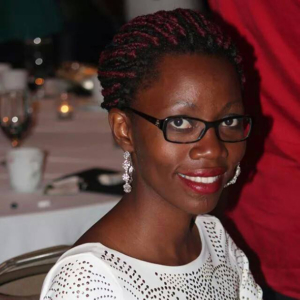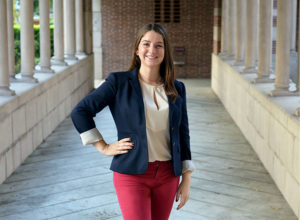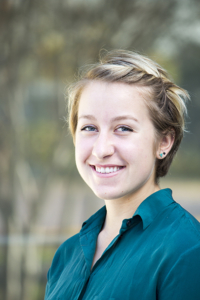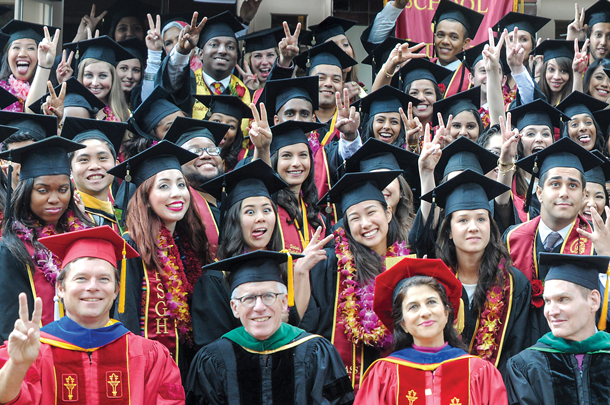Four graduating students from Keck School of Medicine of USC’s Bachelor of Science in Global Health and Master of Public Health programs sat down recently to reflect on their academic careers and the paths that led them to commencement day, May 13 and 14.
*****

Sandra Najuna
Sandra Najuna
What degree/s have you been pursuing?
Sandra: I have been pursuing a master’s of public health (global health leadership track).
Why did you pick that degree program?
Sandra: I picked the program because of my keen interest in preventive medicine.
How did you become interested in global health?
Sandra: On the first day of the MPH program, the USC Institute for Global Health faculty presented several projects they had around the world. I am Ugandan, and I was greatly inspired by what I will be able to do in health to help countries like myself.
Describe your most memorable global health experience while attending USC.
Sandra: My most memorable global experience was attending the 68th World Health Assembly in May 2015 and thereafter an internship with the Ebola team in World Health Organization. I worked with a great team of people and learned so much about how global outbreaks are dealt with and was amazed by how much detail the international community pays to surveillance during emergencies. I have also been amazed by how great the faculty and staff at USC care. They made my journey at USC smooth.
What is the biggest global health lesson you learned?
Sandra: The World Health Organization only makes recommendations, hardly any mandates. A country’s health system is as strong as prioritized by each government. Third world countries therefore have to spend more than they currently do on health, especially in preventative medicine.
What you are doing after graduation?
Sandra: I am currently coordinating global health projects for USC Institute for Global Health Institute in Uganda.
What’s your dream career?
Sandra: I would like to pursue a career in global health, specifically in project management and governance.
What advice would you pass on to incoming students?
Sandra: Keep an open mind in the first year. You will be surprised which elements of public health will fascinate you. Be a sponge, absorb all information from all classes; you will need it someday. Finding a faculty member to mentor you will take you a long way. They are very helpful. Take a little time to enjoy USC, beyond MPH. Time flies so fast and before you know it, you are done with MPH. Above all, pursuing MPH is going to be the best decision you will ever make.
*****

Allison Ficht
Allison Ficht
What degree/s have you been pursuing?
Allison: I have been pursuing my master’s of public health with a concentration in policy.
Why did you pick that degree program?
Allison: Prior to attending graduate school I worked for nonprofits both domestically and globally and found that I enjoyed the policy side of my jobs.
How did you become interested in global health?
Allison: After I graduated from college I spent time living on the border of Thailand and Myanmar working with Burmese migrant children. I taught English in the mornings and did advocacy work on behalf of the organization I was working for, and it was then that I realized I wanted to spend time working to give agency to those who do not have it but desperately need it.
Describe your most memorable global health experience while attending USC.
Allison: My most memorable global health experience at USC was attending the World Health Assembly in 2015. I got to hear Angela Merkel speak, meet Margaret Chan and learn about the direction of public health from ministers of health, ambassadors and directors of renowned global health programs like the Bill and Melinda Gates Foundation.
What is the biggest global health lesson you learned?
Allison: The biggest global health lesson I’m taking away from my time at USC is that there is always more to learn; global health is a complex and delicate realm to work in, and any opportunity to learn from peers, professionals and stakeholders is one that should be utilized.
What you are doing after graduation?
Allison: I have been working in global policy at AIDS Healthcare Foundation for the past eight months and will continue to do so after graduation.
What’s your dream career?
Allison: I honestly do not have a dream career. When I started at USC I was unsure of whether I wanted to go into domestic or global health, and the trajectory of my experiences have been so exciting that I can only hope that it continues!!
What advice would you pass on to incoming students?
Allison: My best advice for incoming students is to keep an open mind about the courses, internships, and opportunities offered during the program, because you never know what might pique your interest or complement your existing coursework. Take advantage of the professors’ knowledge and mentorship—they are incredibly helpful and have a lot to share!!!
*****

Lucy Ruderman
Lucy Ruderman
What degree/s have you been pursuing?
Lucy: B.S. in Global Health with minors in French and Policy, Planning and Development: Nonprofits, Philanthropy, and Volunteerism track.
Why did you pick that degree program?
Lucy: I picked the combinational of global health and policy because I knew I wanted to work in the health sector with the ability to affect people on a population level.
How did you become interested in global health?
Lucy: I became interested in global health when I traveled to Cambodia and Laos for a summer in high school. The lack of hygiene education in the rural areas really stuck with me and drove me to pursue a career where I could help work to positively change how health policies and programs are implemented.
Describe your most memorable global health experience while attending USC.
Lucy: I got the opportunity to travel to Ghana the summer after my freshman year to conduct an independent research project alongside an NGO I had been working with prior. I was able to see the NGO’s programs in action and talk to the people that they were working with. For example, the NGO set up women’s groups in the villages they worked with, where women could come together to discuss what they felt needed to be changed or developed in their community. This was the first time that I saw women empowerment programs in action and it impassioned me to work towards a concentration in maternal and reproductive health rights.
What is the biggest global health lesson you learned?
Lucy: I’ve learned so much! The biggest thing that I learned is that you need to look at the root causes of everything. One anecdote that has always stuck with me is, in addition to encouraging the use of bed nets people need to understand that homes should be built with slanted roofs so that stagnant water does not pool on top of the home and create a breeding ground for mosquitos and malaria. Everything begins and ends with education and community empowerment, and I think that has been my biggest takeaway.
What you are doing after graduation?
Lucy: I am entering the Peace Corps as an “HIV/AIDS Civil Society Capacity Building Volunteer” in Botswana.
What’s your dream career?
Lucy: My dream career is to work in a think tank, international organization, or government agency to write and implement policy in the realm of reproductive health rights.
What advice would you pass on to incoming students?
Lucy: Get to know your professors! Everyone at USC, and particularly those at the USC Institute for Global Health, have done incredible research and projects in the past and present. You never know who you will meet at USC and what potential doors that will open!
*****

Martha Ryan
Martha Ryan
What degree/s have you been pursuing?
Martha: I have been pursuing a Bachelor of Science degree in Global Health.
Why did you pick that degree program?
Martha: My path to the global health major has been anything but straightforward; I came into USC as an environmental studies major and after one semester I switched to geology. Another semester later I switched to international relations. I found out about the global health program my junior year and I was drawn to its interdisciplinary curriculum because I clearly had a hard time focusing on just one subject! The program was a great fit for me because it combined my curiosity about global processes and my passion for social justice with my desire to learn science and math. I was also excited by the Keck professors’ work and I was eager to get involved in their research.
How did you become interested in global health?
Martha: I’ve always been interested in global responses to humanitarian emergencies. I traveled a lot when I was growing up, and seeing enormous poverty around the world had a big impact on me. I wanted to learn more about how such immense inequality arose and the systems of power that perpetuate disparity. The health field seemed like a good place to start because it can help improve basic human needs where they are lacking.
Describe your most memorable global health experience while attending USC.
Martha: While I was studying abroad in Delhi, I got involved with a research project on government involvement in the red light district. To collect data about how sex workers interact with government agencies, I visited several brothels and interviewed stakeholders in the red light district. It was a completely different culture and lifestyle than anything I had seen before. I was also thrilled that USC faculty continued to support me and my work from overseas. I was so grateful and impressed that my professors cared about my work enough to provide feedback and guidance on my project throughout the whole process.
What is the biggest global health lesson you learned?
Martha: Being critical of global health institutions and legacies is an absolutely crucial lesson that I’ve learned. Taking the time to comprehensively analyze how a global health intervention has impacted a specific community is so important.
What you are doing after graduation?
Martha: I will be traveling to India on a Fulbright research grant to study stigma against sex work for nine months.
What’s your dream career?
Martha: I’m still trying to figure that out! I am more dedicated to certain issues rather than pursuing a particular career. For example, advocacy and activism against stigma is one area I’d like to continue pursuing, but I’m not sure yet if I will work towards that goal through academia, law, or the medical field.
What advice would you pass on to incoming students?
Martha: Studying abroad was extremely influential to shaping my undergraduate career. I would recommend gaining as much international experience as possible. I would also recommend getting involved with faculty research projects beyond the degree requirements. All the research projects I have been involved with have been incredibly interesting and rewarding experiences.
— Larissa Puro


